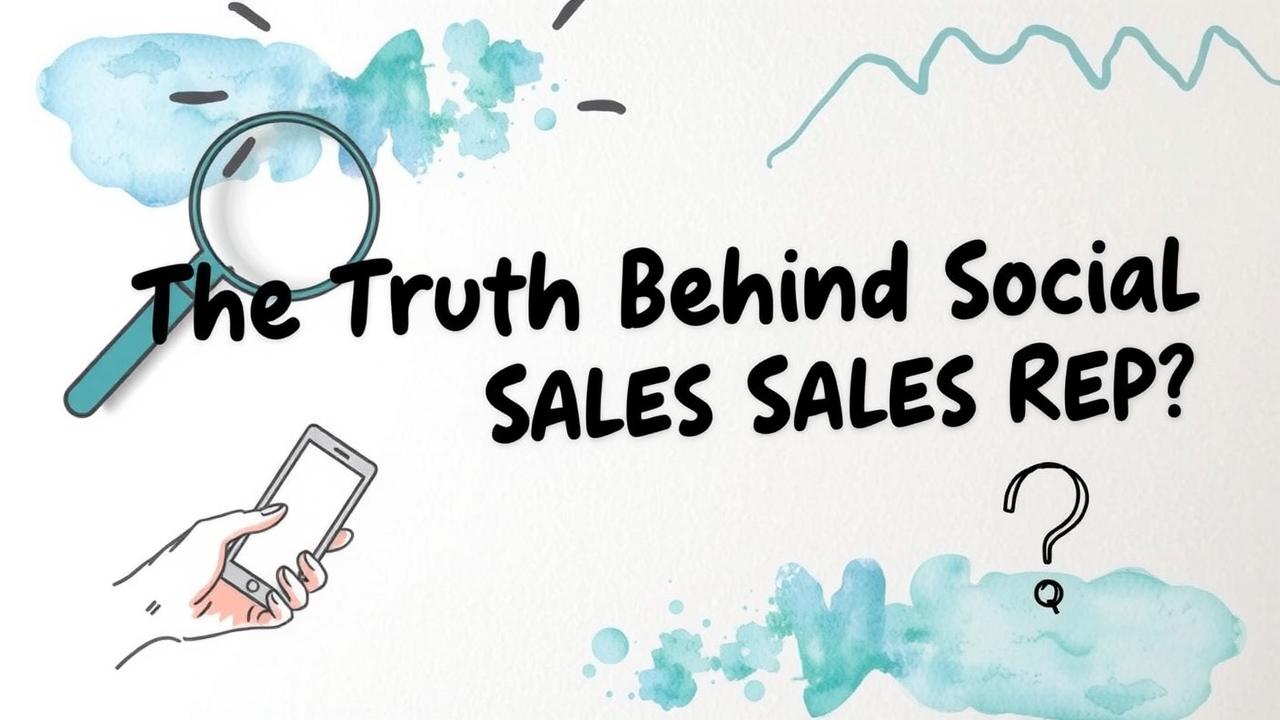Social sales representatives play a crucial role in today’s marketing landscape, using social media to connect with potential customers and boost product sales. Their effectiveness often depends on professionalism, clear communication, and ethical practices. Many credible reps work for well-known companies, which can enhance their trustworthiness. However, some consumers remain skeptical due to past experiences with scams. To identify legitimate reps, look for positive testimonials and case studies that showcase their success. Beware of red flags like unrealistic claims or high-pressure tactics as these can signal untrustworthy behavior. Ultimately, understanding the nuances of social selling is essential for making informed decisions.
Definition of Social Sales Representatives
 Social sales representatives are professionals who use social media platforms to connect with potential customers, showcase products, and ultimately drive sales. They blend traditional sales techniques with modern digital marketing strategies to create engaging interactions. For example, a social sales rep might use platforms like Instagram or LinkedIn to share product demonstrations, answer customer inquiries in real-time, and foster relationships that lead to sales. By leveraging social media’s wide reach, they can target specific audiences and tailor their messaging to fit the needs and interests of their followers.
Social sales representatives are professionals who use social media platforms to connect with potential customers, showcase products, and ultimately drive sales. They blend traditional sales techniques with modern digital marketing strategies to create engaging interactions. For example, a social sales rep might use platforms like Instagram or LinkedIn to share product demonstrations, answer customer inquiries in real-time, and foster relationships that lead to sales. By leveraging social media’s wide reach, they can target specific audiences and tailor their messaging to fit the needs and interests of their followers.
Factors That Determine Legitimacy
Several factors can help you determine if a social sales representative is legitimate. First, professionalism is key. Legitimate reps communicate clearly, practice honesty, and follow ethical marketing guidelines. If they seem unprofessional or vague, it’s a red flag. Another important factor is their affiliation with established companies. Reps working for well-known brands are generally more credible. Transparency also plays a significant role; genuine representatives openly disclose their affiliations and any sponsorships. Industry perceptions vary, with many businesses appreciating the personalized engagement social selling offers, while some consumers remain skeptical due to past scams. Evidence of legitimacy can come from positive testimonials and successful case studies that showcase the effectiveness of their strategies. Additionally, a strong, authentic social media presence can validate their credibility. However, be cautious of unrealistic promises or high-pressure tactics, as these are often signs of less legitimate representatives. Always check for clear contact information, as reputable reps are usually accessible for inquiries.
| Legitimacy Factors | Description |
|---|---|
| Professionalism | Exhibiting clear communication, honesty, and ethical marketing practices. |
| Affiliation with Established Companies | Working for reputable companies or well-known brands to enhance legitimacy. |
| Transparency | Being open about affiliations and disclosing any sponsorships or partnerships. |
Positive and Negative Perceptions in the Industry
 The perception of social sales representatives in the industry varies significantly among businesses and consumers. On one hand, many companies appreciate social sales reps for their ability to connect directly with potential customers through platforms like Facebook, Instagram, and LinkedIn. This direct engagement allows for tailored marketing strategies that can lead to higher conversion rates and customer loyalty. For instance, a brand might use a social sales rep to showcase a product in a live demo, creating an authentic experience that resonates with viewers.
The perception of social sales representatives in the industry varies significantly among businesses and consumers. On one hand, many companies appreciate social sales reps for their ability to connect directly with potential customers through platforms like Facebook, Instagram, and LinkedIn. This direct engagement allows for tailored marketing strategies that can lead to higher conversion rates and customer loyalty. For instance, a brand might use a social sales rep to showcase a product in a live demo, creating an authentic experience that resonates with viewers.
On the other hand, there exists a level of skepticism among consumers. Some individuals have encountered scams or misleading practices, which makes them wary of social sales reps. This skepticism is often fueled by stories of representatives who overpromise results or use aggressive sales tactics, leading to a negative impression of the entire field. For example, a rep who claims that anyone can earn thousands of dollars in a week with little effort can raise red flags for potential customers.
Additionally, the rise of influencers and affiliate marketers has blurred the lines, making it challenging for consumers to distinguish between genuine sales reps and those who may not have their best interests at heart. The mixed perceptions in the industry highlight the need for both social sales representatives and consumers to navigate this landscape carefully, ensuring that trust and transparency are prioritized.
Evidence Supporting Legitimacy
Testimonials from satisfied customers can validate the effectiveness of social sales representatives. For example, a company that saw a 40% increase in sales after collaborating with a social sales rep can inspire trust in potential customers. Case studies also play a vital role; they provide concrete examples of how social selling has positively impacted various businesses. A brand that successfully utilized social media to drive engagement and sales can serve as proof of legitimacy. Additionally, a strong and authentic social media presence enhances credibility. When social sales reps have a well-maintained profile with genuine interactions, it reflects their professionalism. This can include regular posts, responses to customer inquiries, and sharing positive experiences from clients. Such evidence can help consumers differentiate between legitimate reps and those who may not have their best interests at heart.
Risks and Warning Signs to Watch
When considering social sales representatives, it’s important to be aware of potential risks and warning signs that could indicate a less-than-legitimate operation. One major red flag is unrealistic promises. If a rep claims you can earn huge sums of money with little effort or that a product works miracles, it’s wise to proceed with caution. Legitimate representatives focus on realistic outcomes and transparent conversations about their products.
Another warning sign is a lack of contact information. Genuine sales reps typically provide clear channels for communication and are open to inquiries. If you can’t find a phone number, email, or physical address, this could suggest that the rep is not trustworthy.
Moreover, pay attention to the sales tactics being used. If you feel pressured to make quick decisions or buy a product immediately, it’s a sign that the representative may not have your best interests at heart. Authentic social sales representatives prioritize building relationships over making a quick sale. Always trust your instincts; if something feels off, it’s worth investigating further.
- Lack of transparency in product claims
- Overly aggressive sales tactics
- High-pressure sales environments
- Promises of unrealistic earnings
- Absence of established company reputation
- Poor customer reviews and testimonials
- Unclear return policies or lengthy contracts
Staying Informed in the Social Sales Landscape
As the social sales landscape evolves, staying informed is crucial for both consumers and sales representatives. Social media is constantly changing, with new platforms emerging and algorithms shifting, impacting how products are marketed and sold. For instance, platforms like TikTok have introduced innovative ways for brands to engage with younger audiences, while established platforms like Facebook and Instagram continue to adapt their features for business use.
Consumers should familiarize themselves with these trends to recognize credible social sales representatives. This includes understanding the types of content that resonate with audiences and the best practices for engagement. Additionally, keeping an eye on industry news can help consumers spot genuine sales reps and avoid scams.
Sales reps, on the other hand, must stay updated on the latest tools and techniques for social selling. They should engage in continuous learning, participating in webinars, and following industry leaders to refine their strategies. By doing so, they can enhance their effectiveness and build trust with their audience.
In this fast-paced environment, knowledge is key. Both consumers and sales reps benefit from understanding the nuances of social selling, leading to more meaningful connections and successful transactions.
Frequently Asked Questions
1. What exactly does a social sales rep do?
A social sales rep helps businesses sell their products or services through social media platforms by connecting with potential customers and building relationships.
2. Are social sales reps real people or just automated bots?
Most social sales reps are real individuals who engage with customers, though some companies may use automated tools to assist with responses.
3. How can I tell if a social sales rep is trustworthy?
You can check their online presence, reviews from other customers, and see if they have a professional profile on social media to gauge their credibility.
4. What skills should a good social sales rep have?
A good social sales rep should have strong communication skills, be knowledgeable about the product, and understand how to engage effectively on social media.
5. Can social sales reps really help increase sales?
Yes, social sales reps can help increase sales by creating targeted interactions and building relationships that lead to customer purchases.
TL;DR Social sales representatives engage customers through social media to promote products and drive sales. Their legitimacy hinges on professionalism, affiliations with reputable companies, and transparency. While many view social selling positively for its engagement benefits, skepticism remains due to past scams. Evidence of legitimacy includes positive testimonials and a strong social media presence. However, watch for red flags like unrealistic promises and high-pressure tactics. Staying informed and researching representatives is essential to navigate the evolving social sales landscape.
